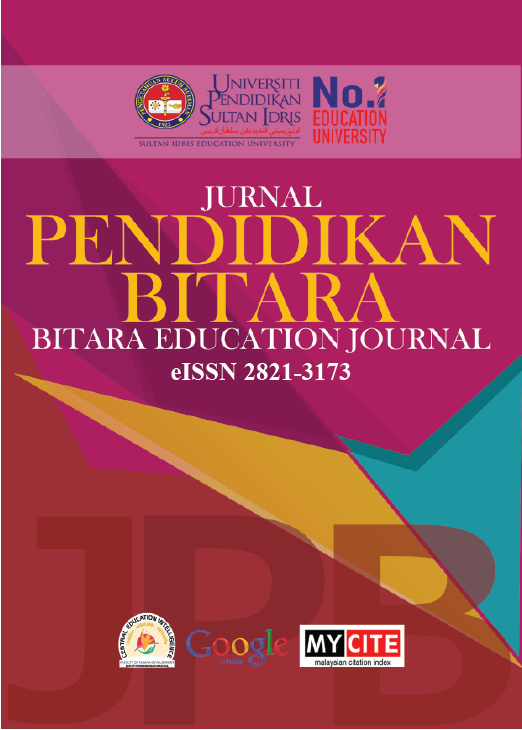Students' Perception of Online Learning Course of Speech and Arabic Debate during the COVID-19 Pandemic
Persepsi Pelajar Terhadap Pembelajaran Dalam Talian Kursus Pidato Dan Debat Arab Ketika Pandemik COVID-19
DOI:
https://doi.org/10.37134/bitara.vol14.2.3.2021Keywords:
Perception, Online Learning, Arabic Debate Speech, COVID-19 PandemicAbstract
The COVID-19 pandemic that hit the world starting in late 2019 has changed the country’s education system drastically and holistically. Learning and teaching previously implemented face -to -face is completely replaced by online learning mode through the use of various digital applications. This study aims to identify students' perceptions of learning in Arabic speech and debate courses during the Covid-19 pandemic era. A total of 76 second year students of the Bachelor of Arabic, Sultan Zainal Abidin University (UniSZA), Terengganu were involved as respondents. This study uses a quantitative research method that is data collection through questionnaires distributed to respondents after the completion of the semester. There are 26 statement sentences in the questionnaire representing the respondents ’perceptions towards learning Arabic speech and debate courses online. A five -level scale was used to determine the level of respondents' perception. The findings of the study were analyzed using descriptive analysis of mean and standard deviation. The results of the study found that students showed a positive perception of online learning while taking Arabic speech and debate courses. Therefore, educators should constantly improve the use of digital technology in teaching to ensure a conducive atmosphere in online learning classes. This aims to build a positive perception among students towards the world of digital education, especially in this era of the COVID-19 pandemic.
Downloads
References
Agelyia Murugan, George Teoh Boon Sai, Agnes Liau Wei Lin. (2017). Technological Readiness of UiTM students in Using Mobile Phones in the English Language Classroom Malaysian. Online Journal of Educational Technology, 5(2).
Alias Baba (1999). Statistik Penyelidikan dalam Pendidikan dan Sains Sosial. Bangi: Penerbit Universiti Kebangsaan Malaysia.
Anchalee Ngampornchai & Jonathan Adams. (2016). Students’ acceptance and readiness for E-learning in Northeastern Thailand. International Journal of Educational Technology in Higher Education, 13(34): 2-13. DOI 10.1186/s41239-016-0034-x
Dewan Bahasa dan Pustaka. (2017). https://prpm.dbp.gov.my/cari1?keyword=persepsi
Joi L. Moore, Camille Dickson-Deane, Krista Galyen. (2011). E-Learning, online learning, and distance learning environments: Are they the same? The Internet and Higher Education, 14(2): 129-135. https://doi.org/10.1016/j.iheduc.2010.10.001.
Kementerian Pendidikan Malaysia. (2020). Manual Pengajaran dan Pembelajaran di Rumah.
Khoirun Nisak Mat Saad, Norasyikin Osman, Kamarul Shukri Mohd Teh & Siti Salwa Mohd Noor. (2015). Penggunaan Kelip dalam Pembelajaran Bahasa Arab: Suatu Tinjauan di Universiti Sultan Zainal Abidin. The Online Journal of Islamic Education, 3(2): 1-8.
Liaw, S. S. (2008). Investigating students’ perceived satisfaction, behavioral intention, and effectiveness of e-learning: A case study of the Blackboard system. Computers & Education, 51(2): 864-873. doi:10.1016/j.compedu.2007.09.005
M. Kaviza. (2020). Kesediaan murid terhadap penggunaan aplikasi google classroom sebagai platform pembelajaran sejarah. Malaysian Journal of Social Sciences and Humanities (MJSSH), 5(4):108-115). DOI: https://doi.org/10.47405/mjssh.v5i4.397 108
Mathewson, G. C. (1994). Model of Attitude Influence upon Reading and Learning to Read in R. B. Ruddell, M.R. Ruddell, & H. Singer (Eds.), Theoretical Models and Processes of Reading. Newark, D.E.: International Reading Association,-.
Muhammad Izzat Mailis, Zuriani Hanim Zaini & Nur Hafizaliyana binti Hassan. (2020). Persepsi Pelajar Kolej Universiti Islam Melaka terhadap Pelaksanaan Pembelajaran Secara dalam Talian dalam Era Pandemik Covid-1. Jurnal Kesidang, 5: 88-99
Ngadi, E. (2020). Implikasi Pengajaran dan Pembelajaran atas talian. Artikel diakses April, 2021 from https://www.usim.edu.my/news/in-our-words/covid19-implikasi-pengajaran-dan-pembelajaran-atas-talian/
Sihes, A.J., & Sani, N. (2010). Perlaksanaan E-Pembelajaran Di Kalangan Pelajar Fakulti Pendidikan Dan Fakulti Kejuruteraan Mekanikal Universiti Teknologi Malaysia, Skudai, 1-10.
Tzu-Chin Rejoice Chou. (2014). A Scale of University Students' Attitudes toward e-Learning on the Moodle System. International Journal of Online Pedagogy and Course Design, 4: 52-69.
Zailawati Husin & Fariza Khalid. (2014). Kekangan Terhadap Penggunaan Teknologi Maklumat Dan Komunikasi (ICT) Dalam Pengajaran Dan Pembelajaran (PdP) Di Kalangan Guru Sekolah Di Wilayah Persekutuan Kuala Lumpur. Dlm. Aliran Terkini Dalam Pengajaran Sumber & Teknologi Maklumat: Impaknya ke atas Penyelidikan dalam Pendidikan. Bangi: Penerbit Fakulti Pendidikan, UKM.





